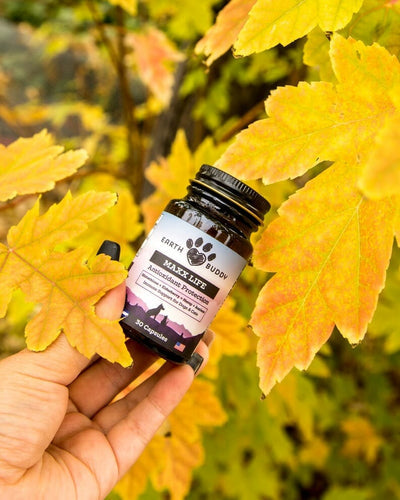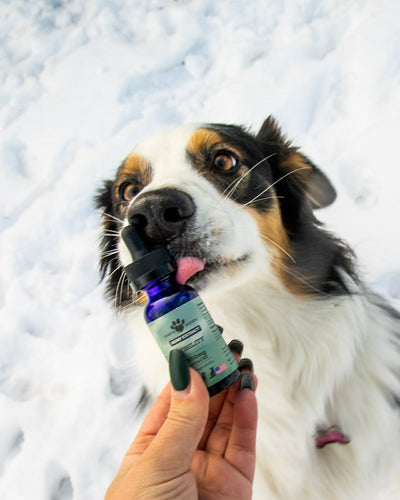As pet owners, we are always on the lookout for ways to keep our furry friends healthy and happy. A balanced diet and regular exercise are essential, but sometimes, we may consider adding supplements to boost our pets' well-being. Quercetin and glutathione are two popular supplements that have been researched for their potential benefits for dogs. But which one is right for your dog?
In this blog post, we will explore the benefits of quercetin and glutathione for dogs and help you make an informed decision.
Quercetin Versus Glutathione for Pets
To understand the value of each supplement, you must first understand what each supplement does, where it comes from, and the benefits it possesses. Which supplement is best to ensure you have healthy dogs?
Quercetin for Dogs
Quercetin is a naturally occurring flavonoid found in many fruits, vegetables, and grains. A flavonoid is a type of naturally occurring plant compound that belongs to a larger group of phytonutrients called polyphenols. Flavonoids are widely distributed in plants, and they are responsible for the bright colors of many fruits, vegetables, and flowers.
Quercetin is a potent antioxidant and promotes normal inflammatory responses, and normal histamine properties. Due to these attributes, quercetin has gained popularity as a supplement for dogs. In addition to serving as a supplement, it has also been incorporated into many dogs’ diets.
Quercetin is a naturally occurring flavonoid found in a variety of fruits, vegetables, and other plant-based foods. Some of the primary dietary sources of quercetin include:
- Apples: Apples, particularly their skin, are a good source of quercetin. Consuming apples with their skin on can provide higher amounts of this flavonoid.
- Berries: Various types of berries, such as blueberries, blackberries, raspberries, and cranberries, are rich in quercetin.
- Green leafy vegetables: Spinach, kale, and other green leafy vegetables also contain quercetin.
- Broccoli: Broccoli is another vegetable rich in quercetin, providing both antioxidant and discomfort benefits.
- Herbs: Some herbs, such as parsley and sage, are good sources of quercetin.
Keep in mind that the quercetin content in these foods can vary depending on factors such as soil quality, growing conditions, and food processing methods. Including a variety of these foods in your dog's diet can help increase quercetin intake and provide a range of other essential nutrients for overall health.
Health Benefits of Quercetin for Dogs
Quercetin is most commonly referred to as ‘nature’s benadryl,’ although there are more health effects than just maintaining histamine levels. The health benefits of quercetin include:
- Antioxidant properties: Quercetin is a powerful antioxidant that helps neutralize free radicals in the body. Antioxidants have been shown to aid in the elimination of unstable oxygen molecules called free radicals. By neutralizing these harmful molecules, Quercetin supports overall health and helps maintain physical and mental well-being.
- Anti-inflammatory effects: Quercetin has been shown to inhibit the release of inflammatory responses, such as histamines and leukotrienes. This means quercetin maintains a normal inflammatory cytokine cascade promoting normal inflammatory pathways.
- Antihistamine properties: Histamine is a compound released by immune cells in response to allergens. Quercetin helps maintain normal histamine levels which may help support pets with seasonal allergies.
Glutathione for Dogs
Glutathione is a naturally occurring antioxidant molecule in the body, composed of three amino acids: cysteine, glutamate, and glycine. It’s found in every cell in your dog’s body and plays a crucial role in detoxification, immune function, and protection against oxidative stress.
Glutathione levels may decrease with age or due to various health conditions, which also makes glutathione a good supplement to incorporate into your dog’s regimen. Environmental pollutants, heavy metals, and chemicals can also increase the body's demand for antioxidants, including glutathione, leading to its depletion.
Glutathione-Rich Food Sources
Glutathione can be found in certain foods, although the amounts may vary depending on factors such as growing conditions and processing methods. Consuming foods rich in these amino acids, or glutathione itself, can help support your dog’s body's glutathione production. Some foods containing glutathione include:
- Cruciferous vegetables: While dogs are primarily carnivorous, some fruits and vegetables can be safely included in their diet to provide glutathione, in addition to essential vitamins, minerals, and other antioxidants. Broccoli, Brussels sprouts, cauliflower, cabbage, and kale are rich in sulfur-containing compounds that support glutathione production in the body.
- Asparagus: Asparagus is another food with high glutathione content, and it also contains other nutrients beneficial for health.
- Beef liver: Promotes selenium and glutathione production. Grass-fed cattle have higher concentrations of glutathione than grain-fed cattle.
- Milk thistle: Milk thistle contains a compound called silymarin which is known for its antioxidant properties. Silymarin increases glutathione levels and assists in preventing depletion of the glutathione antioxidant.
- Avocado: Avocados are a good source of glutathione and also contain healthy fats that promote overall health.
- Spinach: Spinach is a source of glutathione, as well as other essential nutrients, such as vitamins and minerals.
- Fish: Fish, particularly fatty fish like salmon and mackerel, are rich in omega-3 fatty acids and provide the amino acid cysteine, which is a key component of glutathione.
- Lean meats: Poultry and other lean meats provide cysteine and other amino acids required for glutathione production.
- Eggs: Eggs are a good source of cysteine and other amino acids, contributing to glutathione production.
It is important to note that the bioavailability of dietary glutathione may be limited, as it can be broken down during digestion. This means that it can be difficult for your dog to obtain a sufficient amount of glutathione without supplementation. However, consuming foods rich in the precursors of glutathione, such as cysteine, can still help support the body's natural production of this essential antioxidant.
Health Benefits of Glutathione for Dogs
Glutathione supports long-term health in dogs of all ages. It’s also recommended for dogs seven years of age or older to maintain proper body functions and overall well-being. The many benefits of glutathione for dogs include the following:
- Antioxidant properties: Glutathione is a powerful antioxidant that helps neutralize free radicals and protect cells from oxidative damage. Antioxidants help remove damaging free radicals which assists the body in combating environmental pollutants. It also helps regenerate other antioxidants, such as vitamin C and vitamin E, boosting their effectiveness.
- Vitamin E Supplementation: Vitamin E supplementation, like that provided by the production of glutathione, also provides antioxidant properties to dogs. Vitamin E supports the immune system keeping your dog’s health in optimal condition.
- Detoxification: Glutathione plays a critical role in supporting normal detoxification processes, binding to toxins and facilitating their removal from the body. By supporting liver function, glutathione helps maintain optimal health and supports the body from exposure to heavy metal or environmental toxins.
- Immune system support: Glutathione is essential for proper immune function, supporting both the innate and adaptive immune responses. It helps protect immune cells from oxidative damage and supports the production of white blood cells, which are crucial for maintaining overall health.
- Skin and coat health: Glutathione has been shown to promote healthy skin and coat by promoting normal inflammatory pathways, supporting cellular health, and helping eliminate free radicals associated with the aging process. Glutathione also helps achieve a soft, silky, shiny, and healthy coat.
- Cognitive function: Research suggests that glutathione may help protect brain cells and support cognitive function in aging dogs. By reducing discomfort and oxidative stress in the brain, glutathione may help maintain cognitive health and support and promote long-term health.
- Joint health: Glutathione eases joint stiffness due to normal daily exercise and activity by promoting the functions of joint and connective tissue. Glutathione also helps support the structural integrity of joints and connective tissues.
- Vision-Related Health: The eyes are particularly susceptible to damage from free radicals as well as oxidative stress. Glutathione promotes long-term ocular health by providing antioxidants that help remove damaging free radicals.
It is not accurate to say that glutathione is categorically better than quercetin for dogs, as each supplement has its own unique benefits and potential uses. The best supplement for your dog depends on their specific health needs. However, whereas quercetin isn’t always necessary for your dog, glutathione is critical for optimal well-being.
However, if you could obtain a highly bioavailable source of both, that would be the best case scenario.
Glutathione as a Supplement
If you’re looking for a supplement that possesses a wide range of benefits to optimize your dog’s overall health, glutathione is it. Although you can feed your dog foods containing glutathione, the amount they will absorb won’t be sufficient enough to make a significant impact. That’s why Earth Buddy has created Maxx-Life Glutathione.
This supplement includes not only glutathione but also Immune Support Complex and Hemp Essence Trinity to maintain optimal health in your dog as they age.
Glutathione Support Complex combines encapsulated or liposomal glutathione to provide an immediate boost in glutathione for dogs and cats. Additionally, we include amino acids that encourage the body’s natural production of glutathione that include L-cysteine, L-glutamine, L-glycine, and alpha lipoic acid. The benefits of these were discussed above.
Immune Support Complex contains a blend of elderberry extract, vitamins C and D, L-lysine, zinc glycinate, and quercetin. Quercetin also acts as a zinc ionophore, which can improve the immune response in dogs and cats.
The benefits of immune system complex, particularly elderberry extract, which is high in quercetin, include:
- Antioxidant protection
- Helps decrease oxidative damage
- Helps maintain normal histamine levels
- Supports pets with seasonal allergies
- Promotes balanced Immune Response

Hemp Essence Trinity is a minimally processed dry sieve Kief. It's packed with intact trichomes to deliver a continuous level of CBD, CBDa, and CBG, as well as other beneficial compounds from hemp.
The benefits of the Hemp Essence Trinity include, but are not limited to, the following:
- CBD: Helps dogs maintain a normal and relaxed disposition, provides essential fatty acids for a healthy coat (fatty acids are vital to everyday health, the heart and cardiovascular systems), and helps keep dogs in peak condition
- CBDa: Relieves occasional discomfort, provides nutrients for a healthy body, and supports normal recovery from stress
- CBG: Supports healthy cellular activity, promotes cognitive function, and supports normal brain and nerve function
Altogether, the Maxx-Life Glutathione supplement provides a full spectrum supplement for your dog. Happy dogs are healthy dogs, and that’s the goal here at Earth Buddy Pet.
For further reading, we recommend:





Comments (0)
There are no comments for this article. Be the first one to leave a message!